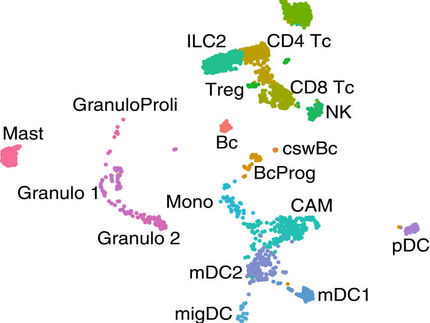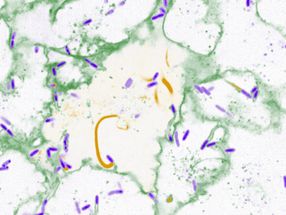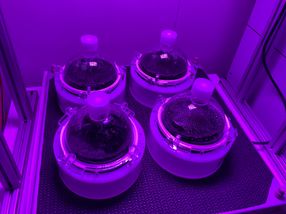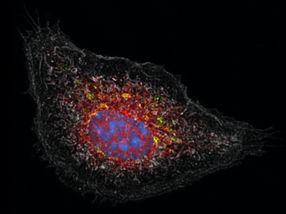New protein found in immune cells
Researchers of the University of Freiburg have discovered Kidins220/ARMS in B cells. They also determined that it plays a decisive role in the production of antibodies and the formation of B cells, which are a type of white blood cells. Various teams of researchers had already found that Kidins220/ARMS is present in nerve cells and in T cells of the immune system. However, that it is present in B cells was unknown until now. "We've discovered a new molecular player in the immune system," said the immunobiologist Prof. Dr. Wolfgang Schamel, adding, "This knowledge could help to develop new medications for autoimmune diseases or other illnesses in the future." The postdoc Dr. Gina J. Fiala from Schamel's lab studied Kidins220/ARMS in B cells for her doctoral thesis. Several other members of the cluster of excellence BIOSS Centre for Biological Signalling Studies also collaborated in this study.

This is artwork painted by the daughter of researcher Susana Minguet. The protein Kidins220 (yellow) interacts with the B cell receptor (red and orange).
Susana Minguet
B lymphocytes, also known as B cells, are the only cells to produce antibodies, which the immune system needs to fight off foreign intruders like pathogens in order to protect the human body. On their surface, B cells carry B cell receptors. These activate the B cells when an antigen - a substance on the surface of a pathogenic germ - binds to them. The team of scientists from the University of Freiburg has discovered that Kidins220/ARMS interacts with the B cell receptor and affects signalling pathways from the receptor to the interior of the cell. Without Kidins220/ARMS, the receptor's ability to send signals is limited. As a result, the B cells manufacture less antibodies and the immune system is weakened.
Kidins220/ARMS is also vital for the formation of B cells. If a mouse cannot produce this protein, the B lymphocytes develop in a way that makes them less functional than the B cells of a healthy immune system. The reason for this is that B cells depend on the signals from the B cell receptor and pre-B cell receptor, which is the early version of a B cell receptor, at various stages of their development. Deficiency in Kidins220/ARMS therefore obstructs the development of B cells.
Original publication
Gina J. Fiala, Iga Janowska, Fabiola Prutek, Elias Hobeika, Annyesha Satapathy, Adrian Sprenger, Thomas Plum, Maximilian Seidl, Jörn Dengjel, Michael Reth, Fabrizia Cesca, Tilman Brummer, Susana Minguet, and Wolfgang W.A. Schamel; "Kidins220/ARMS binds to the B cell antigen receptor and regulates B cell development and activation"; J Exp Med; 2015
Most read news
Original publication
Gina J. Fiala, Iga Janowska, Fabiola Prutek, Elias Hobeika, Annyesha Satapathy, Adrian Sprenger, Thomas Plum, Maximilian Seidl, Jörn Dengjel, Michael Reth, Fabrizia Cesca, Tilman Brummer, Susana Minguet, and Wolfgang W.A. Schamel; "Kidins220/ARMS binds to the B cell antigen receptor and regulates B cell development and activation"; J Exp Med; 2015
Topics
Organizations
Other news from the department science

Get the life science industry in your inbox
From now on, don't miss a thing: Our newsletter for biotechnology, pharma and life sciences brings you up to date every Tuesday and Thursday. The latest industry news, product highlights and innovations - compact and easy to understand in your inbox. Researched by us so you don't have to.
























































